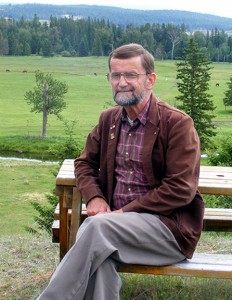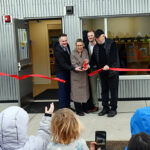Home »

Restoration of ancient salmon runs not on Victoria’s radar
Does the British Columbia government not care about the massive salmon runs that used to return annually to the province in the millions with the iconic species swimming more than a thousand miles up the mighty Columbia River?
This impression is unavoidable if you read the province’s list of principles released last week for the upcoming negotiations with the U.S. on renewing the 1964 Columbia River Treaty.
In the preamble to the principles list, the province says it wishes to “continue the Columbia River Treaty and seek improvements within the existing Treaty framework.” So far, so good. But where does restoration of the lost salmon runs fit into this picture? Not until near the end of the 14 principles listed and it gives little hope that one of the greatest salmon runs on the face of the earth will ever be restored.
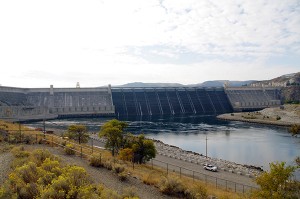
Here’s what Principle 11 says word for word: “Salmon migration into the Columbia River in Canada was eliminated by the Grand Coulee Dam in 1938 (26 years prior to Treaty ratification), and is currently not a Treaty issue. British Columbia’s perspective is that the management of anadromous salmon populations is the responsibility of the Government of Canada and that restoration of fish passage and habitat, if feasible, should be the responsibility of each country regarding their respective infrastructure.”
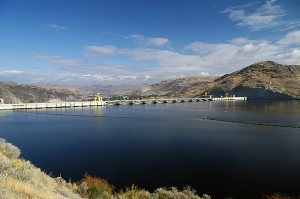
In other words, B.C. passed the buck to Ottawa, which though legally and jurisdictionally correct, makes it clear that restoration of the mighty runs that existed for thousands of years and was the sustenance of First Nations peoples and others for millennia is not a very important matter in Victoria’s mind.
And that’s a damn shame!
Certainly restoring these lost runs won’t be easy. It would be a complex, gargantuan task and extremely expensive. Perhaps even impossible. But surely it’s worth a try by a civilization that has put men on the moon and spent billions building all those dams on the Columbia in the first place. And the biggest of them all – the Grand Coulee – was built 75 years ago in the pit of the Depression. Since then, we’ve learned a lot about respecting the environment.
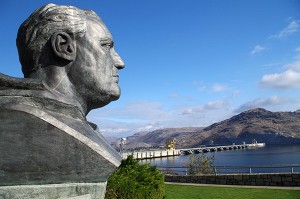 The attitude of the B.C. government is especially galling when you consider the U.S recommendations for a new Columbia River Treaty released in December 2013. In the introduction to the document, the U.S says it recognizes the value of the Treaty “to maximize benefits to both the United States and Canada” and goes on to say the original 1964 Treaty “does not identify ecosystem considerations.” No passing of the buck in those words. The Americans take a broader perspective on Treaty renewal and this can be seen further in the document where it says: “The United States should pursue a joint program with Canada, with shared costs, to investigate, and, if warranted, implement restored fish passage and reintroduction of anadromous fish on the main stem Columbia River to Canadian spawning grounds.”
The attitude of the B.C. government is especially galling when you consider the U.S recommendations for a new Columbia River Treaty released in December 2013. In the introduction to the document, the U.S says it recognizes the value of the Treaty “to maximize benefits to both the United States and Canada” and goes on to say the original 1964 Treaty “does not identify ecosystem considerations.” No passing of the buck in those words. The Americans take a broader perspective on Treaty renewal and this can be seen further in the document where it says: “The United States should pursue a joint program with Canada, with shared costs, to investigate, and, if warranted, implement restored fish passage and reintroduction of anadromous fish on the main stem Columbia River to Canadian spawning grounds.”
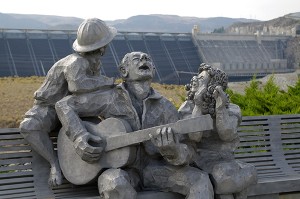 Now it’s important to keep in mind that it was the Americans that blocked access to the Canadian spawning grounds by building the Grand Coulee Dam. But it’s also important to keep in mind that there was little, if any, protest out of Victoria or Ottawa over this. Environmentalism as we know it today didn’t exist back then. Hell, in war time when the US Army Corps of Engineers built the concrete monstrosity and paid the workers 80 cents-an-hour to do it, they asked the Bonneville Power Administration (BPA) to commission a propaganda song in praise of the dam’s glories and they got the greatest folk singer of the day, Woody Guthrie, to do it.
Now it’s important to keep in mind that it was the Americans that blocked access to the Canadian spawning grounds by building the Grand Coulee Dam. But it’s also important to keep in mind that there was little, if any, protest out of Victoria or Ottawa over this. Environmentalism as we know it today didn’t exist back then. Hell, in war time when the US Army Corps of Engineers built the concrete monstrosity and paid the workers 80 cents-an-hour to do it, they asked the Bonneville Power Administration (BPA) to commission a propaganda song in praise of the dam’s glories and they got the greatest folk singer of the day, Woody Guthrie, to do it.
“Roll On, Columbia, Roll On” was a great hit at the time with Woody singing, amongst other things, that electricity from the dam “turned darkness to dawn.” I guess it did and it also forced 3,000 people out of their homes, flooded 75,500 acres of land almost to the Canadian border and irreparably damaged one of the greatest salmon runs that ever existed.
And now we have a chance to repair this grievous wound. Someone should tell Victoria.
– Gerry Warner is a retired journalist and a Cranbrook City Councillor who grew up on the banks of the Columbia before it was dammed in Canada. His opinions are his own.
